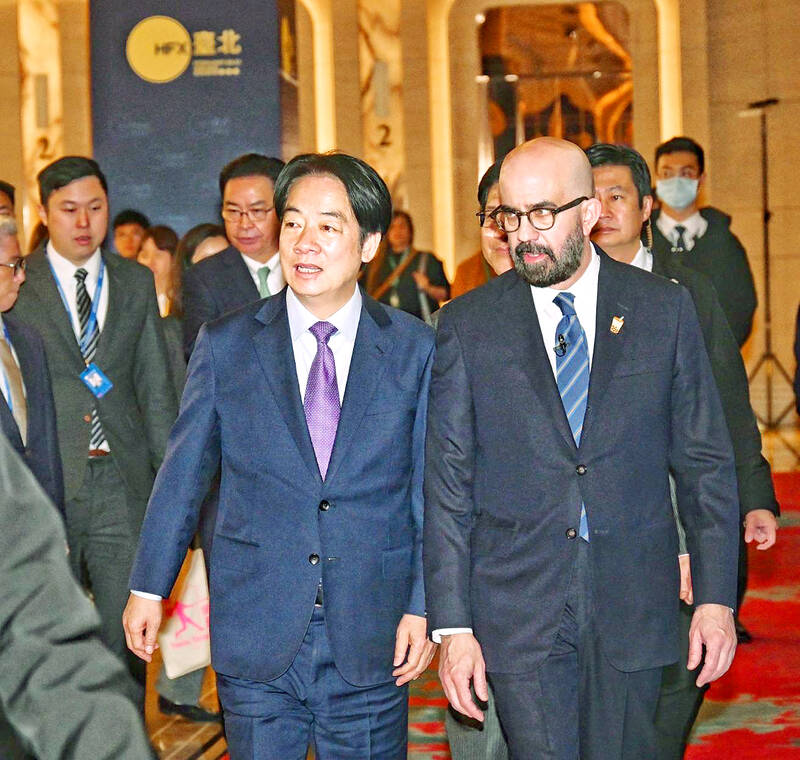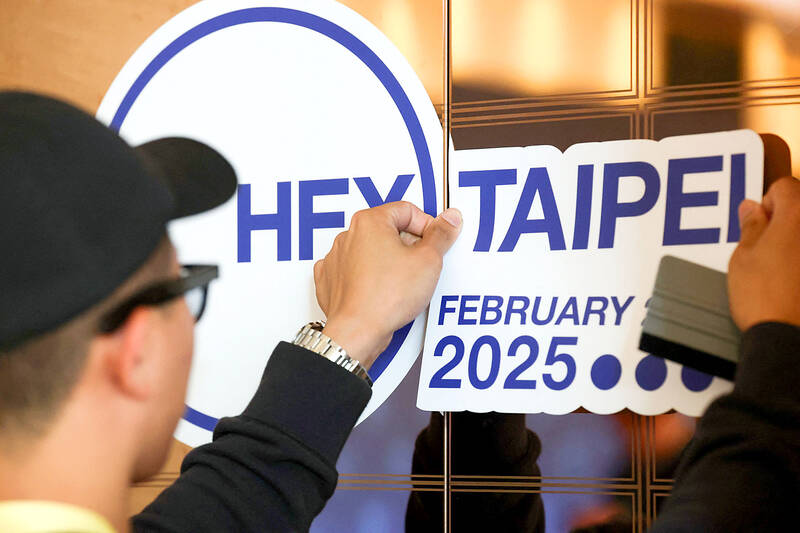Democratic nations must band together to counter consolidating authoritarian powers and build “non-red” supply chains, President William Lai (賴清德) said at the opening of the two-day Halifax International Security Forum (HFX) yesterday.
Taiwan occupies a critical position in the first island chain, safeguarding national sovereignty, maintaining a democratic way of life, and defending peace and security in the Taiwan Strait while facing authoritarian threats directly, Lai said at the event, which is being held in Taipei for the first time.
Taiwan will uphold “peace through strength,” he added.

Photo: Fang Pin-chao, Taipei Times
As a responsible member of the international community, Taiwan will not provoke conflicts and will maintain the “status quo” in the Taiwan Strait, while being willing to engage in dialogue with China under the principles of equality and dignity, he said.
The government has proposed increasing defense spending to more than 3 percent of GDP and established the Whole-of-Society Defense Resilience Committee last year, which is to pursue global peace by deepening relations with democratic allies and improving their defense resilience, he said.
Technological strength, being the backbone of national defense, is key to deterring the expansion of authoritarianism, while it is also crucial to improve economic resilience by boosting industrial development, he said.

Photo: Ann Wang, Reuters
As a country with a leading position in the semiconductor industry, Taiwan is willing to work with democratic allies to build a “non-red supply chain” to pursue mutual economic benefits and maintain global peace, he said.
HFX president Peter van Praagh said that the forum being held in Taipei demonstrated the support of the international community for Taiwan.
“Taiwan is a vital democracy whose continued freedom and security is important not only to the people of Taiwan, but to the security of the entire world,” Van Praagh told a news conference before the event.
It is the first time that the forum is being held outside North America since it was launched in 2009 and it is not a coincidence that it is held in Taiwan, which is a vibrant democratic country facing potential aggression from its neighbor using “gray zone” tactics, Van Praagh said.
The aim of the forum is to explore how international society should cope with the situation and most importantly what Taiwan can do, he said.
“Through HFX Taipei, I wanted to bring democracies to Taipei to see and understand why Taiwan deserves the international community’s friendship and support,” Van Praagh added.
He thanked United Microelectronics Corp (聯電) founder Robert Tsao (曹興誠), who also gave a speech, for his support.
Asked how US President Donald Trump’s stance toward the Ukraine war could affect Taiwan, Tsao said that Taiwan could unite and demonstrate its determination to safeguard democracy, despite not being able to predict what Trump would do.
The US will not help a country where 60 percent of its people support unification, so Taiwan should “help itself before expecting help from others,” Tsao said.
The international society views Taiwan as a whole, despite its internal differences, he said, adding that no political struggle should sacrifice Taiwan’s sovereignty and international status.
In his speech, Tsao thanked the forum for excluding China’s participation and not bowing to its pressure by including Taiwan.
The event features on-and-off-the-record speeches by former government officials and academics from more than 70 countries, including former president Tsai Ing-wen (蔡英文) and Akie Abe, former Japanese prime minister Shinzo Abe’s widow, on issues concerning democracy, security, resilience and partnership, the organizers said.
HFX is a Washington-based organization that has run the Halifax International Security Forum in Nova Scotia, Canada, every year since 2009.

Seventy percent of middle and elementary schools now conduct English classes entirely in English, the Ministry of Education said, as it encourages schools nationwide to adopt this practice Minister of Education (MOE) Cheng Ying-yao (鄭英耀) is scheduled to present a report on the government’s bilingual education policy to the Legislative Yuan’s Education and Culture Committee today. The report would outline strategies aimed at expanding access to education, reducing regional disparities and improving talent cultivation. Implementation of bilingual education policies has varied across local governments, occasionally drawing public criticism. For example, some schools have required teachers of non-English subjects to pass English proficiency

‘FORM OF PROTEST’: The German Institute Taipei said it was ‘shocked’ to see Nazi symbolism used in connection with political aims as it condemned the incident Sung Chien-liang (宋建樑), who led efforts to recall Democratic Progressive Party (DPP) Legislator Lee Kun-cheng (李坤城), was released on bail of NT$80,000 yesterday amid an outcry over a Nazi armband he wore to questioning the night before. Sung arrived at the New Taipei City District Prosecutors’ Office for questioning in a recall petition forgery case on Tuesday night wearing a red armband bearing a swastika, carrying a copy of Adolf Hitler’s Mein Kampf and giving a Nazi salute. Sung left the building at 1:15am without the armband and apparently covering the book with a coat. This is a serious international scandal and Chinese

TRADE: The premier pledged safeguards on ‘Made in Taiwan’ labeling, anti-dumping measures and stricter export controls to strengthen its position in trade talks Products labeled “made in Taiwan” must be genuinely made in Taiwan, Premier Cho Jung-tai (卓榮泰) said yesterday, vowing to enforce strict safeguards against “origin laundering” and initiate anti-dumping investigations to prevent China dumping its products in Taiwan. Cho made the remarks in a discussion session with representatives from industries in Kaohsiung. In response to the US government’s recent announcement of “reciprocal” tariffs on its trading partners, President William Lai (賴清德) and Cho last week began a series of consultations with industry leaders nationwide to gather feedback and address concerns. Taiwanese and US officials held a videoconference on Friday evening to discuss the

PERSONAL DATA: The implicated KMT members allegedly compiled their petitions by copying names from party lists without the consent of the people concerned Judicial authorities searched six locations yesterday and questioned six people, including one elderly Chinese Nationalist Party (KMT) member and five KMT Youth League associates, about alleged signature forgery and fraud relating to their recall efforts against two Democratic Progressive Party (DPP) legislators. After launching a probe into alleged signature forgery and related fraud in the KMT’s recall effort, prosecutors received a number of complaints, including about one petition that had 1,748 signatures of voters whose family members said they had already passed away, and also voters who said they did not approve the use of their name, Taipei Deputy Chief Prosecutor